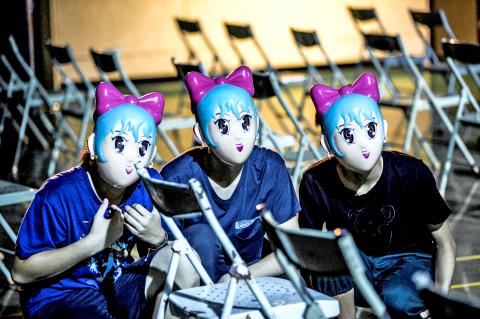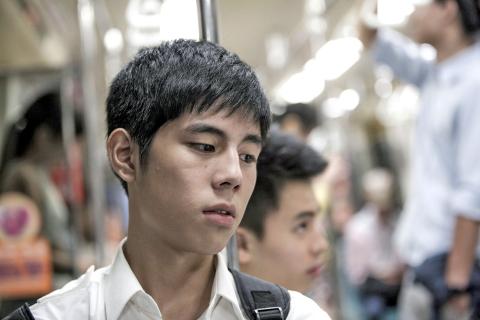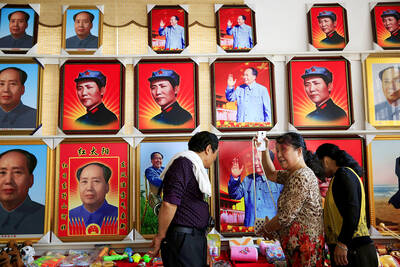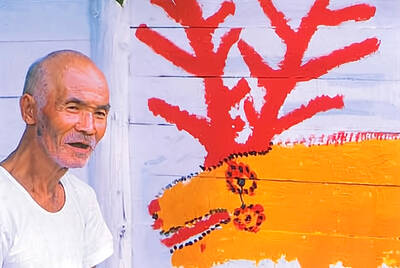At a time when the sound of teen film spells overuse and cliche, Yee Chih-yen’s (易智言) Meeting Dr. Sun (行動代號:孫中山) comes as a refreshing surprise. The comedy, about a group of teenage boys and their whimsical plans to address their poverty, casts a lyrical and vigorous look into Taiwan’s social inequality through the eyes of the young. Alternating between farcical humor and emotional acuteness, Yee’s latest work can be seen as an ode to the waves of youthful civil disobedience against the system, which climaxed in the Sunflower movement.
Lefty (Zhan Huai-yun, 詹懷雲), one of the central characters, lives with his grandmother who earns NT$15 for every plastic flower she makes at home. Lefty believes he is the poorest kid in his high school and is unable to pay the “class fee” extorted by a classmate. While hiding from the bully in the school storeroom one day, he discovers a bronze statue of Sun Yat-sen (孫逸仙). For Lefty, however, the statue doesn’t signify the ROC’s founding father, but a financial windfall in the form of scrap metal worth a big chunk of money. The slab, he thinks, will be his ticket out of poverty.
And so he immediately devises a plan to steal and sell the valuable statue, calling on his equally impecunious friends to help. However, he soon finds out that Sky (Wei Han-ting, 魏漢鼎), a boy who goes to the same school, is also plotting to turn the discard into quick cash.

Photo courtesy of Activator Marketing Company
The two hold a match to decide who is poorer and thus needs the money more. Using food tastings at supermarkets as the source of his daily diet and sleeping on the streets to avoid his drunken father’s violent outburst, Sky wins. Readily accepting his defeat, Lefty offers to collaborate with Sky, whom he thinks a new comrade.
Watching the enthusiastic Lefty sharing the details of his plan, Sky has something else in mind.
When the big night comes, two groups of masked thieves appear on campus. The battle over the statute of Sun Yat-sen ends up with Sky and Lefty lying on the empty street in Ximending (西門町), exhausted. As the wailing of police sirens comes near, they recognize the problem of poverty and fight it together.

Photo courtesy of Activator Marketing Company
In Meeting Dr. Sun, director Yee does a superb job in translating the anger against the unjust, corrupt system into an expressive comedy. The most noticeable example is the use of pantomime in the sequence in which the young burglars try to carry out their operation. What’s more striking is how the story finds its most resonant strength in juxtaposing the light with the unbearable. In the sequence in which the group of teenagers bicker over who comes from the most disadvantaged family, what starts out as fun raillery ends up with an indignant cry from Sky: “the children of our children are doomed to be poor.”
More fable than drama, the film approaches the complex social problems with lucid simplicity.
Equally essential to the narrative is the soundtrack composed by Chris Hou (侯志堅). Hou’s music is playful, delicate and vivacious at the same time, almost like a waltz of the humiliated and the insulted.
Towards the end of the film, we follow the bronze statue as it’s transported on a truck through the streets of Taipei. Suddenly, the camera pans up to show the gang of teenage boys, who raise their hands in solidarity, the Taipei World Trade Center towering in the background. It is a poignant moment, filled with poetry, and like the film itself, resonates long after the closing credits.

Taiwan can often feel woefully behind on global trends, from fashion to food, and influences can sometimes feel like the last on the metaphorical bandwagon. In the West, suddenly every burger is being smashed and honey has become “hot” and we’re all drinking orange wine. But it took a good while for a smash burger in Taipei to come across my radar. For the uninitiated, a smash burger is, well, a normal burger patty but smashed flat. Originally, I didn’t understand. Surely the best part of a burger is the thick patty with all the juiciness of the beef, the

The ultimate goal of the Chinese Communist Party (CCP) is the total and overwhelming domination of everything within the sphere of what it considers China and deems as theirs. All decision-making by the CCP must be understood through that lens. Any decision made is to entrench — or ideally expand that power. They are fiercely hostile to anything that weakens or compromises their control of “China.” By design, they will stop at nothing to ensure that there is no distinction between the CCP and the Chinese nation, people, culture, civilization, religion, economy, property, military or government — they are all subsidiary

This year’s Miss Universe in Thailand has been marred by ugly drama, with allegations of an insult to a beauty queen’s intellect, a walkout by pageant contestants and a tearful tantrum by the host. More than 120 women from across the world have gathered in Thailand, vying to be crowned Miss Universe in a contest considered one of the “big four” of global beauty pageants. But the runup has been dominated by the off-stage antics of the coiffed contestants and their Thai hosts, escalating into a feminist firestorm drawing the attention of Mexico’s president. On Tuesday, Mexican delegate Fatima Bosch staged a

Nov.10 to Nov.16 As he moved a large stone that had fallen from a truck near his field, 65-year-old Lin Yuan (林淵) felt a sudden urge. He fetched his tools and began to carve. The recently retired farmer had been feeling restless after a lifetime of hard labor in Yuchi Township (魚池), Nantou County. His first piece, Stone Fairy Maiden (石仙姑), completed in 1977, was reportedly a representation of his late wife. This version of how Lin began his late-life art career is recorded in Nantou County historian Teng Hsiang-yang’s (鄧相揚) 2009 biography of him. His expressive work eventually caught the attention